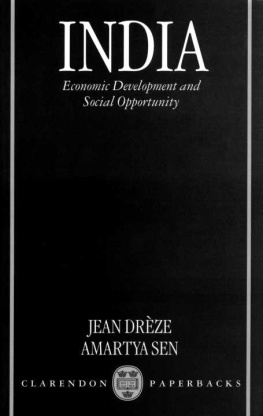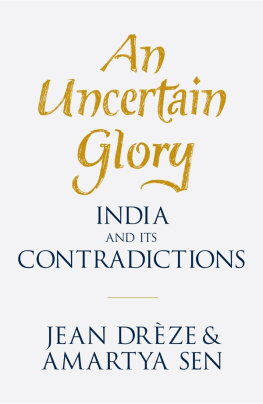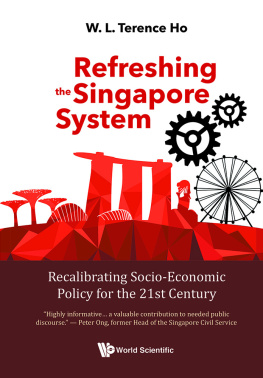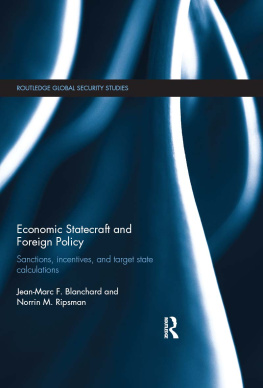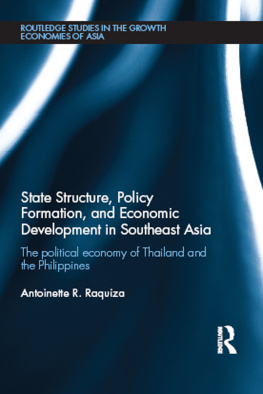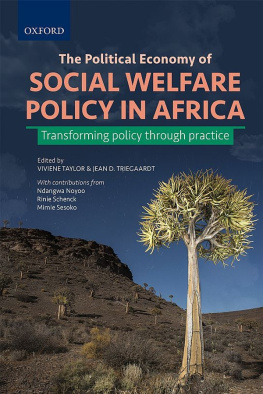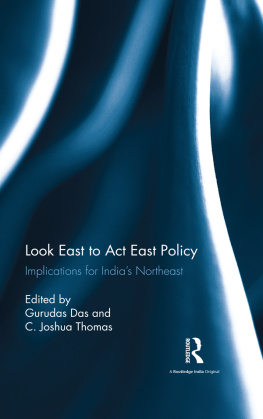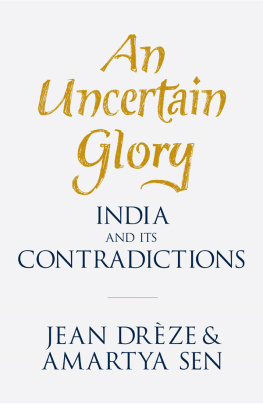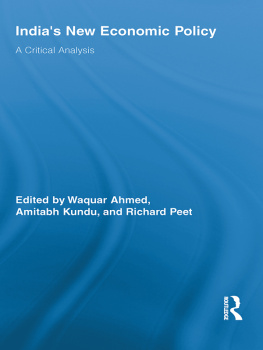India
Economic Development and Social Opportunity
India
Economic Development and
Social Opportunity
JEAN DREZE
and
AMARTYA SEN






PREFACE
We have tried, in this monograph, to analyse the task of economic development in India in a broad perspective, in which social as well as economic opportunities have central roles. We consider, therefore, not only the facilities offered-important as they are-by wellfunctioning markets and beneficial exchanges, but also the fundamental role of human capabilities, and their dependence on basic education, health services, ownership patterns, social stratification, gender relations, and the opportunity of social cooperation as well as political protest and opposition. Variations in social opportunities not only lead to diverse achievements in the quality of life, but also influence economic performance, and in particular, the extent to which the facilities offered by functioning markets can be used by the citizens in general.
This general approach is explored fairly extensively, drawing on empirical findings from different parts of India, and also on international comparisons. We outline in particular what can be learned from the experiences of other countries-successful as well as unsuccessful ones-and also from the varieties of experiences within India. Special attention is paid to the role of basic education in social transformation as well as economic expansion. The importance of women's agency in bringing about major changes is another central area of investigation in this work. There is also considerable discussion of the role of political and social movements, particularly in confronting deep-seated inequalities.
At the end of the monograph we present a substantial Statistical Appendix, partly as a supplement to the empirical arguments presented here, but also as general information which might be of interest to the reader. Since we do discuss in reasonable detail the nature of the economic challenge faced in India at this time, there is some possibility of treating this book also as an introduction to aspects of the Indian economy (usable even by those readers-those dreadful ones!-who are uninterested in the main theses of this monograph).
The broad perspective presented here, we believe, has some relevance in understanding the obstacles to economic development in India and the basic failure of public policies to remove them. Even though the expansion of social opportunities was very much the central theme in the vision that the leaders of the Indian independence movement had presented to the country at the time the British left, rather little attempt has, in fact, been made to turn that vision into any kind of reality. An opportunity for a break from the past, in this respect, could have been seized when economic reforms were initiated in 1991, but the focus of attention in that programme has been almost exclusively on the opening up of the Indian economy and on broadening the reach of the markets. Those are certainly worthy goals, and the need for reform had been strong for a long time in the over-regulated Indian economy, but the lack of any initiative towards a radical change in social policies, including those in basic education and elementary health care, is a major failure, with deeply negative implications on the prospects of improving living conditions and even on the chances of success of the market reforms themselves. While this book is not primarily a commentary or a critique of contemporary economic policies in India, that subject receives some attention in the general context of diagnosing the roots of India's economic and social backwardness.

Expansions of basic human capabilities, including such freedoms as the ability to live long, to read and write, to escape preventable illnesses, to work outside the family irrespective of gender, and to participate in collaborative as well as adversarial politics, not only influence the quality of life that the Indian people can enjoy, but also affect the real opportunities they have to participate in economic expansion. An illustration of the compartmentalized nature of official Indian thinking on this subject is provided by the statement made on behalf of the Government of India to the `Group of 77' in its meeting at the United Nations in New York last September, asserting that `the concepts of sustainable human development and of human security' involve a `conceptual derailment of our basic purpose of development cooperation'. The statement was made precisely at a time when the mini-epidemic of plague in India was frightening foreign tourists and businessmen away from India, and the consequences of neglecting `sustainable human development and human security' were painfully apparent not only in living conditions in India but also in its impact on India's putative attempt at integration with the world economy.
The policy limitations relate not only to governmental decisions, but also to the nature of public discussion, particularly the potential for criticizing these decisions. So much energy and wrath have been spent on attacking or defending liberalization and deregulation that the monumental neglect of social inequalities and deprivations in public policy has received astonishingly little attention in these debates. The issues underlying liberalization are not, of course, trivial, but engagement on these matters-in opposition or in defence-cannot justify the conformist tranquillity on the neglected provisions of public education, health care, and other direct means of promoting basic human capabilities. In fact, sometimes contentious regulational matters seem to get astonishing priority in political discussions over more foundational concerns related directly to the well-being and freedom of the mass of Indian citizens. Debates on such questions as the details of tax concessions to be given to multinationals, or whether Indians should drink Coca Cola, or whether the private sector should be allowed to operate city buses, tend to `crowd out' the time that is left to discuss the abysmal situation of basic education and elementary health care, or the persistence of debilitating social inequalities, or other issues that have a crucial bearing on the well-being and freedom of the population. In a multi-party democracy, there is scope for influencing the agenda of the government through systematic opposition, and the need to examine the priorities of public criticism is as strong as is the necessity that the government should scrutinize its own relative weights and concerns.
The Kerala study has been prepared by V.K. Ramachandran, the West Bengal study by Sunil Sengupta and Haris Gazdar, and the Uttar Pradesh study by jean Dreze and Haris Gazdar. We are extremely grateful to Ramachandran, Sengupta, and Gazdar for their contributions. Parts of Chapter 7 of this book also draw on recent research undertaken by Jean Dreze in collaboration with Mamta Murthi and Anne-Catherine Guio.

